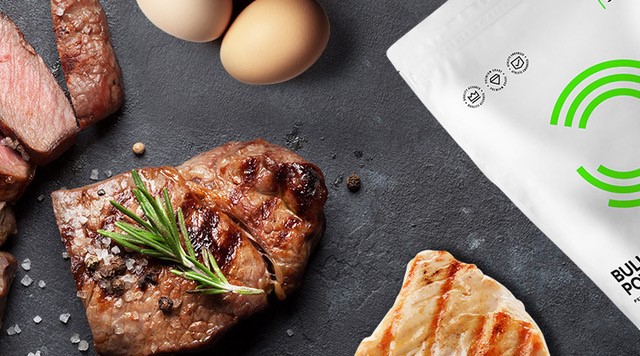Phenylalanine is an essential amino acid that can be found in many foods, drinks and supplements. Discover the huge range of benefits that Phenylalanine can provide inside and outside of the gym.
Contents
What is Phenylalanine?
Phenylalanine Benefits
Phenylalanine Side Effects
Phenylalanine Dosage
Which Foods Contain Phenylalanine?
Phenylalanine in Drinks
Phenylalanine for Vegans
Phenylalanine & Libido
What is Phenylalanine?
Phenylalanine is a completely natural amino acid that can be found in foods or taken as a supplement. Your body uses phenylalanine to produce protein.
Phenylalanine is an essential amino acid, which means your body can’t synthesise it, making it essential that you get extra from your diet or a supplement. One thing to bear in mind is that it’s difficult to get precise amounts of the amino acid from food, so using a supplement is much easier for many people.
Phenylalanine isn’t just integral to protein production in your muscles, brain, blood, and organs. It also makes other molecules in the body, and helps the body communicate with chemical signals.
Phenylalanine plays a key role in the production of tyrosine, epinephrine and norepinephrine (important stress response molecules), and the happy hormone dopamine which can help you learn and form memories.
There are two forms of phenylalanine: L-phenylalanine and D-phenylalanine; the difference lies in the molecular structure. L-phenylalanine is found in foods, and D-phenylalanine is a synthesised form (usually used for medical reasons). At Bulk™ we sell DL Phenylalanine – a combination of both forms of Phenylalanine.
Phenylalanine Benefits
- Phenylalanine is important for building muscle and repairing soft tissue
- Because of its link with signalling and brain health, it could be useful for feelings of wellbeing and a healthy mindset
- Phenylalanine improves skin pigmentation
Phenylalanine Side Effects
According to the Food and Drug Administration, Phenylalanine is “generally recognised as safe”, and, as it’s naturally found in foods, there’s no reason to think it should have any side effects. However, if you are one of the few people with phenylketonuria (PKU), you will already know that your body can’t process phenylalanine properly. So, you shouldn’t take any kind of phenylalanine supplement.
Phenylalanine Dosage
We suggest 700mg in water (you can also combine it with l-tyrosine or other amino acids). Our DL Phenylalanine has a little scoop which makes micro dosing easy.
Phenylalanine is a safe and natural amino acid supplement. Studies suggest that you can take high doses with no side effects. But there’s no need to go over and above a recommended intake.
Which Foods Contain Phenylalanine?
Phenylalanine is a natural amino acid, so it is found in plenty of foods. These include,
- Soy foods and soy products
- Roasted soybeans
- Dried tofu
- Seeds
- Pumpkin
- Watermelon
- Eggs
- Cheese
- Parmesan
- Gruyere
- Beans
- Pinto beans
- White beans
- Nuts
- Peanuts
- Almonds
- Seafood
- Lobster
- Salmon
- Meats
- Roast beef
- Bacon
If your diet has sufficient protein, and you get your protein from a wide variety of foods, you will probably get enough of the essential amino acids.
The downside to getting phenylalanine from food is that you can never know exactly how much you are getting, and you cannot separate it out from other amino acids. If you want to be specific with your intake, use a quality phenylalanine supplement, which is easy to measure out.
Phenylalanine in Drinks
You might have heard that phenylalanine is found in some man made drinks, especially fizzy pop and diet drinks. That’s true, kind of. The artificial sweetener aspartame contains phenylalanine, and of course aspartame is added to some drinks as a sugar replacement.
Whether it is safe to consume phenylalanine in the form of aspartame is one of the hottest areas of debate in diet and nutrition, and studies are still being conducted. It is however recognised as a safe additive for use in food and drinks in the EU and US and holds the E-Number E951.
We believe the best way to add phenylalanine to your diet is through foods or supplementation, not through aspartame in drinks.
Phenylalanine for Vegans
If you eat a vegan diet, you can safely take our DL Phenylalanine supplement. It’s also gluten-free, dairy-free, and even soya-free. Vegans can also get phenylalanine from lots of plant sources. Good choices would be soya beans (edamame beans), other soy products, and seeds (especially pumpkin seeds).
Phenylalanine & Libido
Phenylalanine may have some benefits for libido (depending on the reasons behind the libido issues in the first place). It can support neurotransmitters – including the happy hormone dopamine – and make it easier for chemical signals to travel from the brain to the body. If you have low libido due to low mood or depression, phenylalanine could help by supporting endorphin production. Endorphins make things feel better and more pleasurable, but they can also regulate mood and play a role in hormone release.
Related articles
Looking to learn more? We believe that every person, with support, has the right to transform their lives through fitness. That’s why we’ve put together hundreds of articles with expert advice, all to help you on your fitness journey.
Amino acids: do you need them? BCAAs vs Amino Acids
Beginners guide to HMB What are BCAAs?
BCAA and muscle mass BCAA : The Building Blocks of Muscle
Pheylalanine side effects Amino Acids and BCAAs
Beginner’s Guide to Amino Acids Guide to flavoured leucine, creatine and glutamine










